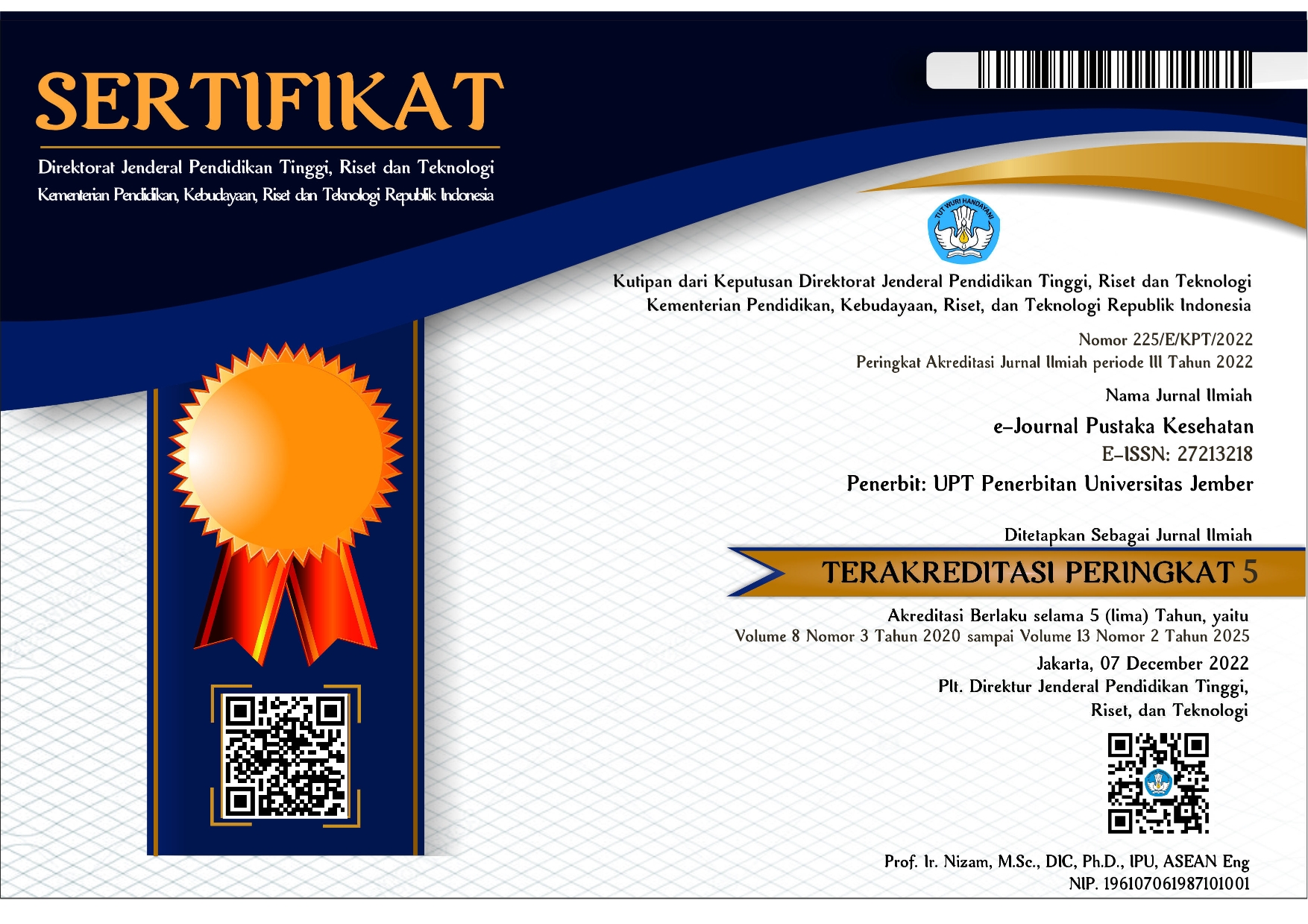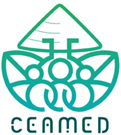Eksplorasi Ekspresi dan Korelasi Survival Gen PRMT pada Adenokarsinoma Kolon: Pendekatan Data TCGA
DOI:
https://doi.org/10.19184/pk.v13i2.53692Keywords:
colon adenocarcinoma, colorectal cancer, gene expression, PRMT, TCGAAbstract
Colorectal cancer is one of the leading causes of cancer-related mortality worldwide, with colon adenocarcinoma being its most common histological subtype. Protein arginine methyltransferase (PRMT) genes play important roles in gene regulation and have been implicated in various cancer types. However, the overall expression patterns and prognostic relevance of PRMTs in colon adenocarcinoma remain insufficiently understood. This study aimed to explore the expression and survival association of PRMT genes using transcriptomic data from The Cancer Genome Atlas-Colon Adenocarcinoma (TCGA-COAD). The expression levels of PRMT1 through PRMT9 were compared between tumor and normal tissues. The results showed that PRMT1, PRMT3, PRMT4, PRMT5, and PRMT7 were more highly expressed in tumor tissues in both paired and unpaired analyses. Furthermore, Kaplan-Meier analysis indicated an association between high PRMT3 expression and reduced overall survival. These findings provide a foundation for further research to better understand the biological role of PRMTs, particularly PRMT3, in the development and progression of colon adenocarcinoma, including functional studies and clinical validation.
Downloads
References
1] Xi Y, Xu P. Global colorectal cancer burden in 2020 and projections to 2040. Translational oncology. 2021;14(10):101174.
[2] Keum N, Giovannucci E. Global burden of colorectal cancer: emerging trends, risk factors and prevention strategies. Nature reviews Gastroenterology & hepatology. 2019;16(12):713-32.
[3] Cao W, Chen HD, Yu YW, Li N, Chen WQ. Changing profiles of cancer burden worldwide and in China: a secondary analysis of the global cancer statistics 2020. Chinese medical journal. 2021;134(7):783-91.
[4] Bray F, Laversanne M, Sung H, Ferlay J, Siegel RL, Soerjomataram I, et al. Global cancer statistics 2022: GLOBOCAN estimates of incidence and mortality worldwide for 36 cancers in 185 countries. CA: a cancer journal for clinicians. 2024;74(3):229-63.
[5] Delle Cave D. Advances in Molecular Mechanisms and Therapeutic Strategies in Colorectal Cancer: A New Era of Precision Medicine. International journal of molecular sciences. 2025;26(1).
[6] Wang Y, Gao X, Ru X, Sun P, Wang J. Identification of gene signatures for COAD using feature selection and Bayesian network approaches. Scientific reports. 2022;12(1):8761.
[7] Ahmad R, Singh JK, Wunnava A, Al-Obeed O, Abdulla M, Srivastava SK. Emerging trends in colorectal cancer: Dysregulated signaling pathways (Review). International journal of molecular medicine. 2021;47(3).
[8] Matsuda T, Fujimoto A, Igarashi Y. Colorectal Cancer: Epidemiology, Risk Factors, and Public Health Strategies. Digestion. 2025;106(2):91-9.
[9] Tomczak K, Czerwińska P, Wiznerowicz M. The Cancer Genome Atlas (TCGA): an immeasurable source of knowledge. Contemporary oncology (Poznan, Poland). 2015;19(1a):A68-77.
[10] Aziz N. Potential Roles Of Methyltransferase Family 16 In Breast Cancer. Syntax Literate Jurnal Ilmiah Indonesia. 2022;7:16157-64.
[11] Hong YH, Aziz N, Park JG, Lee D, Kim JK, Kim SA, et al. The EEF1AKMT3/MAP2K7/TP53 axis suppresses tumor invasiveness and metastasis in gastric cancer. Cancer Letters. 2022;544:215803.
[12] Wolf SS. The protein arginine methyltransferase family: an update about function, new perspectives and the physiological role in humans. Cellular and molecular life sciences : CMLS. 2009;66(13):2109-21.
[13] Hwang JW, Cho Y, Bae GU, Kim SN, Kim YK. Protein arginine methyltransferases: promising targets for cancer therapy. Experimental & molecular medicine. 2021;53(5):788-808.
[14] Zhu Y, Xia T, Chen DQ, Xiong X, Shi L, Zuo Y, et al. Promising role of protein arginine methyltransferases in overcoming anti-cancer drug resistance. Drug resistance updates : reviews and commentaries in antimicrobial and anticancer chemotherapy. 2024;72:101016.
[15] Koboldt DC, Fulton RS, McLellan MD, Schmidt H, Kalicki-Veizer J, McMichael JF, et al. Comprehensive molecular portraits of human breast tumours. Nature. 2012;490(7418):61-70.
[16] Wang H, Hu S, Nie J, Qin X, Zhang X, Wang Q, et al. Comprehensive Analysis of METTLs (METTL1/13/18/21A/23/25/2A/2B/5/6/9) and Associated mRNA Risk Signature in Hepatocellular Carcinoma. Analytical cellular pathology (Amsterdam). 2023;2023:6007431.
[17] Liao Y, Luo Z, Lin Y, Chen H, Chen T, Xu L, et al. PRMT3 drives glioblastoma progression by enhancing HIF1A and glycolytic metabolism. Cell death & disease. 2022;13(11):943.
[18] Li Z, Chen C, Yong H, Jiang L, Wang P, Meng S, et al. PRMT2 promotes RCC tumorigenesis and metastasis via enhancing WNT5A transcriptional expression. Cell death & disease. 2023;14(5):322.
[19] Dong H, He X, Zhang L, Chen W, Lin YC, Liu SB, et al. Targeting PRMT9-mediated arginine methylation suppresses cancer stem cell maintenance and elicits cGAS-mediated anticancer immunity. Nature cancer. 2024;5(4):601-24.
[20] Muzny DM, Bainbridge MN, Chang K, Dinh HH, Drummond JA, Fowler G, et al. Comprehensive molecular characterization of human colon and rectal cancer. Nature. 2012;487(7407):330-7.
[21] Colaprico A, Silva TC, Olsen C, Garofano L, Cava C, Garolini D, et al. TCGAbiolinks: an R/Bioconductor package for integrative analysis of TCGA data. Nucleic Acids Research. 2015;44(8):e71-e.
[22] Győrffy B. Integrated analysis of public datasets for the discovery and validation of survival-associated genes in solid tumors. Innovation (Cambridge (Mass)). 2024;5(3):100625.
[23] Sheffer M, Bacolod MD, Zuk O, Giardina SF, Pincas H, Barany F, et al. Association of survival and disease progression with chromosomal instability: a genomic exploration of colorectal cancer. Proceedings of the National Academy of Sciences of the United States of America. 2009;106(17):7131-6.
[24] Martin ML, Zeng Z, Adileh M, Jacobo A, Li C, Vakiani E, et al. Logarithmic expansion of LGR5(+) cells in human colorectal cancer. Cellular signalling. 2018;42:97-105.
[25] Liu H, Chen X, Wang P, Chen M, Deng C, Qian X, et al. PRMT1-mediated PGK1 arginine methylation promotes colorectal cancer glycolysis and tumorigenesis. Cell death & disease. 2024;15(2):170.
[26] Kim E, Rahmawati L, Aziz N, Kim HG, Kim JH, Kim KH, et al. Protection of c-Fos from autophagic degradation by PRMT1-mediated methylation fosters gastric tumorigenesis. International journal of biological sciences. 2023;19(12):3640-60.
[27] Shifteh D, Sapir T, Pahmer M, Haimowitz A, Goel S, Maitra R. Protein Arginine Methyltransferase 5 as a Therapeutic Target for KRAS Mutated Colorectal Cancer. Cancers. 2020;12(8).
[28] Zhang B, Dong S, Zhu R, Hu C, Hou J, Li Y, et al. Targeting protein arginine methyltransferase 5 inhibits colorectal cancer growth by decreasing arginine methylation of eIF4E and FGFR3. Oncotarget. 2015;6(26):22799-811.
[29] Zhang X, Wang K, Feng X, Wang J, Chu Y, Jia C, et al. PRMT3 promotes tumorigenesis by methylating and stabilizing HIF1α in colorectal cancer. Cell death & disease. 2021;12(11):1066.
[30] Du P, Luo K, Li G, Zhu J, Xiao Q, Li Y, et al. PRMT4 promotes hepatocellular carcinoma progression by activating AKT/mTOR signaling and indicates poor prognosis. International journal of medical sciences. 2021;18(15):3588-98.
[31] Zhang X, Jin M, Chu Y, Liu F, Qu H, Chen C. PRMT6 promotes colorectal cancer progress via activating MYC signaling. Journal of translational medicine. 2025;23(1):74.
Downloads
Published
Issue
Section
License
Copyright (c) 2025 Laily Rahmawati, Kartika Ratna Pertiwi, Nur Aziz

This work is licensed under a Creative Commons Attribution-ShareAlike 4.0 International License.
e-Journal Pustaka Kesehatan has CC-BY-SA or an equivalent license as the optimal license for the publication, distribution, use, and reuse of scholarly work. Authors who publish with this journal retain copyright and grant the journal right of first publication with the work simultaneously licensed under a Creative Commons Attribution-ShareAlike 4.0 International License that allows others to share the work with an acknowledgment of the work's authorship and initial publication in this journal.







